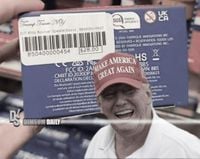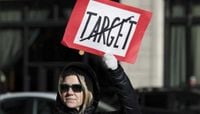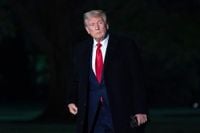On April 14, 2025, MAGA leaders are closely watching events in a courtroom in Washington, D.C., where Meta, the parent company of Facebook, is defending itself against a competition lawsuit filed by the U.S. government. The Federal Trade Commission (FTC) argues that Meta's acquisitions of Instagram in 2012 and WhatsApp in 2014 have given the company an unfair advantage in the social media landscape. This case has significant implications, as it could potentially lead to the breakup of Meta, a company that now owns three of the four most popular social networks.
Mark Zuckerberg, the CEO of Meta, has been actively lobbying to have the case dismissed. He previously paid $25 million to Donald Trump to settle disputes after Meta banned the former president from its platforms in January 2021; Trump was reinstated in July 2024. In addition, Zuckerberg donated $1 million to an inauguration fund in December 2024, further demonstrating his efforts to align with political interests.
The trial, expected to last six to eight weeks, will determine the legality of Meta's acquisitions and their impact on competition in the tech industry. Before the Meta trial concludes, another major antitrust case involving Google is anticipated to reach the remedies phase, which could also reshape the tech landscape.
The stakes are high for both cases, as they echo a long-standing tradition in the United States of demanding government action against market dominance by large corporations. This tradition dates back to the presidency of Theodore Roosevelt, who famously filed 44 lawsuits to break up monopolies during the Gilded Age.
Meanwhile, a separate controversy has emerged from the Trump Tower souvenir shop in New York City. On April 11, 2025, a Chinese netizen discovered that many items, including hats and mugs, labeled "Made in China" were intentionally obscured with stickers to hide their origin. The visitor was stopped by a store employee when attempting to peel off the stickers, while items labeled as "Made in America" were prominently displayed. This incident quickly went viral on Chinese social media, sparking discussions about the contradictions in Trump's messaging regarding American manufacturing.
Walter Masterson, a U.S. actor, had previously reported similar findings at Trump Tower, noting that most merchandise, including the iconic "Make America Great Again" (MAGA) hats, were produced in China. Critics have pointed out the irony of Trump's "Buy American and hire American" agenda while his campaign merchandise has been produced in Chinese factories since 2016, often at a cost of just $1 per item. This has raised questions about the sincerity of Trump's commitment to American manufacturing.
As outrage over these revelations continues to dominate social media, many users have commented on the apparent hypocrisy of Trump's stance on trade and manufacturing. One user remarked, "A single cap costs $47? Who’s even buying this?" Another added, "Trump says buy American, but he buys from China." The irony of Trump's rhetoric contrasts sharply with the reality of his business practices, leading many to call for greater transparency.
In a broader context, since the inauguration of Trump 2.0, many corporations have aligned themselves with the administration's agenda, rolling back gains made in civil rights and social justice. Notably, Meta has dropped its fact-checking initiatives and diversity programs, while other major companies like Target and PepsiCo have also gutted their diversity, equity, and inclusion (DEI) efforts.
This shift has not gone unnoticed. On February 28, 2025, the People's Union led a national economic boycott against Target and other retailers that have capitulated to the Trump administration's policies. The backlash is part of a larger movement in which consumers are demanding accountability from corporations that once championed social justice.
Elon Musk's Tesla has also faced boycotts and cancellations of government contracts, particularly in Europe, as consumers express frustration with the administration's policies. The Department of Government Efficiency (DOGE) has slashed funding for social programs and conducted mass layoffs, further fueling public discontent.
In response to the backlash, the National Action Network has announced a potential boycott of PepsiCo, giving the company a 21-day notice to change its policies. Coca-Cola, in contrast, has refused to abandon its DEI programs, leading some in the African-American community to consider supporting Coca-Cola products over Pepsi.
The current climate of boycotts and consumer activism echoes historical efforts in the African-American freedom struggle, where economic boycotts played a crucial role in advocating for civil rights. From the Montgomery Bus Boycott to Jesse Jackson's campaigns in the 1980s, these movements have demonstrated the power of collective action.
As the landscape of corporate America shifts in response to political pressures, the ongoing trials against Meta and Google, alongside the revelations from Trump Tower, highlight the complex interplay between business practices, political agendas, and consumer expectations. The outcomes of these cases and the public's response to corporate behavior may very well shape the future of American business and governance.
In conclusion, the intertwining narratives of corporate accountability, consumer activism, and political maneuvering continue to unfold. As the trials progress and public sentiment evolves, the implications for both the tech industry and the broader economy will be significant, marking a pivotal moment in the relationship between government, corporations, and the American public.







